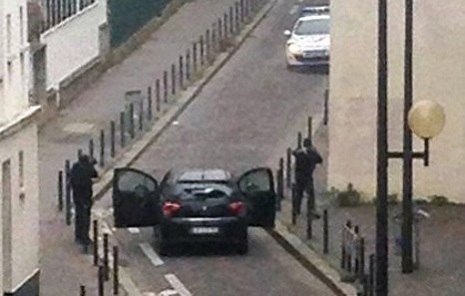A statement by the official publication arm of Al Qaeda in the Arabian Peninsula, which is based in Yemen, indicated that the attack on Charlie Hebdo was in response to the publication’s frequent caricatures lampooning the Prophet Muhammad.
The attack was ordered by the Qaeda leader, Ayman al-Zawahri, in keeping with the wishes of his predecessor, Osama bin Laden, the document said.
The Qaeda statement said that “the one who chose the target, laid the plan and financed the operation is the leadership of the organization.”
The claim of responsibility appeared in an Al Qaeda in the Arabian Peninsula video featuring one of the group’s leaders and simultaneously in a print statement sent to reporters, which bore the insignia of group’s publication arm, Al Malahem.
There was no explanation why the group waited a week to claim responsibility for a spectacular attack that terrorized and galvanized all of France and much of the world. There has been no independent confirmation that Al Qaeda in the Arabian Peninsula was in fact responsible. But it can take days to get approval from leaders of the organization and additional time to produce the videos and documents supporting the claim.
An English version of the claim, distributed online, showed a chilling image of the Eiffel Tower in Paris seeming to dissolve into a wisp of smoke. The headline reads, “Vengeance for the Prophet: A Message Regarding the Blessed Battle of Paris.”
The statement said the attack on Charlie Hebdo was in retaliation for the mocking depictions of Muhammad. Muslims believe all depictions of the prophet are blasphemous.
In the immediate aftermath, two brothers, Saïd and Chérif Kouachi, were accused of the assault on Charlie Hebdo. A day later, a third gunman, identified as Amedy Coulibaly, attacked a police officer and the next day took hostages at a kosher supermarket in Paris. All three attackers were shot to death by the police in separate but nearly simultaneous operations on Friday.
The attacks appear to reflect what analysts have described as an evolution in Qaeda tactics and logistics. Because of heightened surveillance, operatives are trained and assigned general targets, but details on how to carry out the operation are no longer micromanaged by the organization.
The looser command structure reduces communication, and thus reduces the chance of intercepts by intelligence and law enforcement agencies.
American officials have said that Saïd Kouachi went to Yemen for training in 2011. The Paris prosecutor has added that his brother, Chérif, also traveled to Yemen in recent years, but details of both brothers’ travels and contacts remain cloudy.
The statement referred to “heroes of lone jihad,” an apparent reference to militants acting in small groups or alone, such as with the attacks in France, which has been a growing concern among European counterterrorism authorities.
For the first time since the attack on Jan. 7, Charlie Hebdo returned to newsstands on Wednesday, with a cartoon showing Muhammad on its cover holding a sign saying “Je Suis Charlie” and with a tear running down his cheek. It sold out in most places before daybreak.
The statement by Al Qaeda in the Arabian Peninsula called the Kouachi brothers “two heroes of Islam,” but it referred to Mr. Coulibaly’s actions as a coincidence. The statement did not take responsibility for the actions of Mr. Coulibaly, who, in a video released after his death, said he was a supporter of the Islamic State, a rival to Al Qaeda that is also known as ISIS or ISIL.
The statement referred to Mr. Coulibaly as a “mujahid brother.”
A member of Al Qaeda in the Arabian Peninsula, who spoke to The New York Times on the condition of anonymity, said the joint timing of the two operations was a result of the friendship between Mr. Coulibaly and the Kouachi brothers and not a reflection of common planning between the Qaeda group and the Islamic State.
Mr. Coulibaly, who had been imprisoned for a host of petty crime offenses, met Chérif Kouachi in jail, where Mr. Kouachi was serving time in 2005 and 2006 for belonging to a terrorist cell in Paris that sent young men to fight in Iraq.
The statement dealt at some length on Western notions of liberty.
“We have warned you before about the consequences of these deeds that your governments collude with under the pretext of ‘freedom of press’ or ‘freedom of ideas,’ ” the statement said, arguing that such freedoms were “always tamed” except when attacking Islam and “defaming the religion.”
“We tell you once again,” the statement said. “Stop your insults on our Prophet and sanctities. Stop spilling our blood. Leave our lands.”
Elsewhere, the statement told Westerners, “you will look for peace and stability but you will not find it.”
More about:















































